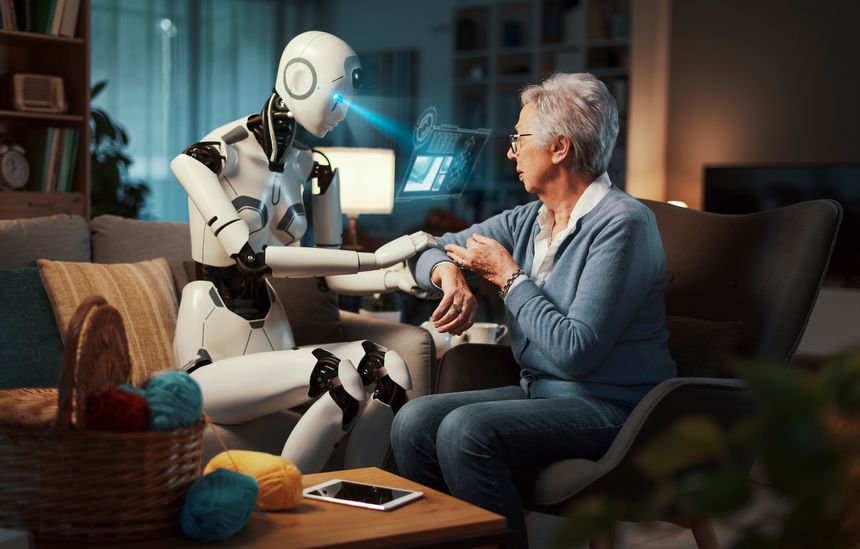Last week’s Tech Innovation in Homecare Conference, hosted by the Homecare Association, delivered an ambitious and inspiring programme of talks. Held at the Institution of Mechanical Engineers, homecare providers, tech suppliers and thought leaders shared numerous examples of best practice and the very latest advancements in the homecare technologies.
I was invited to chair a panel discussing the ethics of digital safety, inclusion and human rights in homecare. We had more than enough material to cover with excellent insights from Katie Thorn and Michelle Corrigan at the Digital Care Hub, Katie Heard from the Good Things Foundation and Andrew Appleyard at Derby City Council.
Key themes
We talked about the importance of interrogating AI systems, so that providers know when AI is present and exactly what it’s doing. We stressed the need to summarise in a single sentence the ways in which the technology works and the consequences of relying on its outputs. If the solution is too complex to comprehend, providers will struggle to instil confidence in their staff and customers or to prevent tech-related anxiety. Safeguarding procedures need to take account of algorithmic harms alongside the traditional dangers relating to physical, financial and emotional harm. Technology tools need to be designed with accessibility and simplicity at their heart, so that their processes are easy to understand and individual rights are easy to enforce. Colleagues need clear lines of accountability and the authority to challenge processes or outputs that don’t look right.
Examples of excellence
We also shared plenty of examples of excellence, with Derby City Council’s digital helper tool ‘Darcie’ enabling users to access information 24/7 and reducing the average wait for a call down from 11 minutes to less than 4 minutes. There were honest conversations about lessons learned along the way and the importance of always having a ‘human in the loop’. That human perspective and the inclusion of digitally excluded voices can ensure digital transformation programmes deliver outcomes which make a real, positive difference to the lives of end users.
Innovation and entrepreneurship in homecare
As the sector continues to grapple with financial and regulatory pressures, our panel discussion was bookended with endless examples of problem-solving and entrepreneurship. Providers are not waiting to be rescued and are instead acting as the driving force for improvements and efficiency in community-based services. We were fortunate to hear from:
- Dr Chris Papadopoulos about the latest developments in robotics and how this might shape future demand for human-centred care services.
- Tech innovators who have developed AI-driven case management tools, client relationship management systems and assistive technologies that can streamline operations and encourage independence.
- Professor Carl Thompson and Peter Zein about the importance of ensuring technology adds real value by meeting the needs of those it serves.
- Sharon Lowrie of BeCaring and Carly Rochester of ME Passport about how their platforms empower care workers to have a greater say in their career development: supporting them to remain and flourish in this vocational industry.
- Panellists who reminded us of the everyday tools that can help international care workers to overcome the linguistic and cultural barriers they face when adapting to life and work in the UK.
Closing insights
We rounded up the day with a frank and insightful conversation between Martin Jones of Home Instead and Seth Sternberg of Honor Technology, describing the latest developments coming out of Silicon Valley. This final session demonstrated the natural synergy between tech and care services, with Seth highlighting the importance of ‘looking a human in the eye and knowing you solved their problem’. Tech solutions can be built at such a pace, the challenges we now face are how to upgrade our infrastructure and change from historic ways of working to accommodate a much more personalised approach to care planning. This will require us to answer some tough questions about how we engage with a newly empowered workforce and whether we will have the conviction to adapt and overcome when the data tells us we need to change course.
What was clear from the discussions is that this is a sector which shrugs off the limitations that might otherwise come from being viewed as a sector ‘in crisis’. Rather than focus on survival, the homecare sector is forging ahead and taking a fresh look at how best to deliver and shape the future of vital public services.
A huge congratulations to the Homecare Association team for putting on such an excellent and thought-provoking event.
For more insights and useful resources, check out the Digital Care Hub and Oxford Project's responsible use of generative ai in social care or arrange a call with us to talk through your digital transformation plan.


/Passle/5f4626f28cb62a0ab4152da6/MediaLibrary/Images/2025-12-17-10-09-17-976-6942814d6438b978e7e6e97f.png)
/Passle/5f4626f28cb62a0ab4152da6/MediaLibrary/Images/2025-08-04-16-03-43-426-6890d9df3f59508dccf9f05f.jpeg)
/Passle/5f4626f28cb62a0ab4152da6/SearchServiceImages/2026-02-13-14-18-32-582-698f32b8b747f3f44004baa5.jpg)
/Passle/5f4626f28cb62a0ab4152da6/SearchServiceImages/2026-02-13-10-25-58-675-698efc362967fdecc1c061ad.jpg)